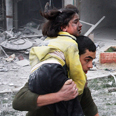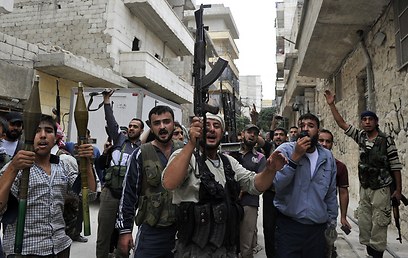
UN: Deadly abuses intensify in Syria
Inquiry commission chairman says indiscriminate and widespread shelling, regular bombardment of cities, mass killing and deliberate firing on civilian targets 'have come to characterize daily lives of civilians in Syria'
The Syrian government has stepped up indiscriminate, heavy bombardments of cities while rebels are executing prisoners condemned in their own makeshift courts without due process, UN investigators said on Monday.
The independent investigators said they were looking into 20 massacres committed by one or the other side and hundreds of "unlawful killings", cases of torture and arbitrary arrests since September in the two-year-old conflict.
Related stories:
- Syria TV shows 'Israeli spy gear'
- Analysis: The Golan and the coming troubles
- Report: Americans training Syria rebels in Jordan
"Indiscriminate and widespread shelling, the regular bombardment of cities, mass killing and the deliberate firing on civilian targets have come to characterize the daily lives of civilians in Syria," Paulo Pinheiro, chairman of the commission of inquiry on Syria, told the UN Human Rights Council.
The uprising in Syria erupted in March 2011 with largely peaceful protests but escalated into a civil war pitting mainly Sunni Muslim rebels against President Bashar Assad, whose minority Alawite faith is an offshoot of Shiite Islam.
"In a disturbing and dangerous trend, mass killings allegedly perpetrated by Popular Committees have at times taken on sectarian overtones," the 10-page UN report said. "Some appear to have been trained and armed by the government."
Pro-Assad Popular Committee militiamen have been documented as operating across Syria, "where at times they are alleged to be participating in house-to-house searches, identity checks, mass arrests, looting and acting as informants", it said.
Karen Koning AbuZayd, an American commissioner, said the committees were formed initially to defend their neighborhoods. "In a way, this is a move by the government to supplement its own manpower as it begins to lose some of the (regular military) manpower that it used to have," she told a news conference.
Syrian Ambassador Faysal Khabbaz Hamoui dismissed the report as based on "partial information from untrustworthy sources" and accused Qatar and Turkey of "supporting terrorism" in Syria.
"There is a conspiracy against Syria. Qatar has financed and armed tens of thousands of mercenaries from 30 countries. Turkey has provided the military bases and sent them into Syria on their jihad," he told the Geneva forum.
"We are not saying that it is a sectarian war but we call attention to sectarian elements in the present conflict," Pinheiro said. Foreign fighters from more than a dozen countries are estimated to comprise less than 10% of the opposition forces fighting the Assad government, he said.
"We don't want to contribute to a paranoia that Syria is being invaded by foreign fighters. But they have a lot of skills and have been very successful in spreading acts of terror inside Syria," said Pinheiro.
More than 1 million Syrian refugees have fled abroad and 2.5 million are uprooted within the country, while more than 70,000 people have been killed in the war, the United Nations says.
The war is mired in a "destructive stalemate, amid heavy shelling and air raids by government forces, the report said.
Both sides have committed violations against civilians, the UN investigators said. They are investigating about 20 cases of massacre, including three in Homs at the start of the year, despite their lack of access to the country.
They said rebel forces often execute captured Syrian soldiers and militiamen and have established detention centers in Homs and Aleppo. Rebels had also taken up positions in or near densely-populated areas, in violation of international law.
"There is an intensification of violations because the war is worsening. You have to look at the totality of the panorama - the murders, the arbitrary arrests and all of it," said Vitit Muntarbhorn, a commission member from Thailand.
"Some groups are exercising or trying to exercise civilian authority without due process of law. So we have allegations for example of sentences being imposed on various people, arrested and captured soldiers and so on, without due process and then being executed, as well as some families," Muntarbhorn said, noting that these were war crimes under the Geneva Convention.
The European Union and United States denounced continuing crimes and said that those responsible must be held accountable.
The UN investigators said that they would give a secret third list of suspects in a sealed envelope to High Commissioner for Human Rights Navi Pillay with a view to future prosecutions.
Carla del Ponte, a former UN war crimes prosecutor who tried ex-Yugoslav President Slobodan Milosevic, is on the panel. Speaking in Italian to reporters, she said: "Sooner or later the International Criminal Court must be seized of the matter.
"I don't think that high-ranking political and military officials can be judged in their own country. We have seen, we have experience, we know that with a president of a nation, it is difficult for countries to put him on trial."
- Receive Ynetnews updates directly to your desktop











